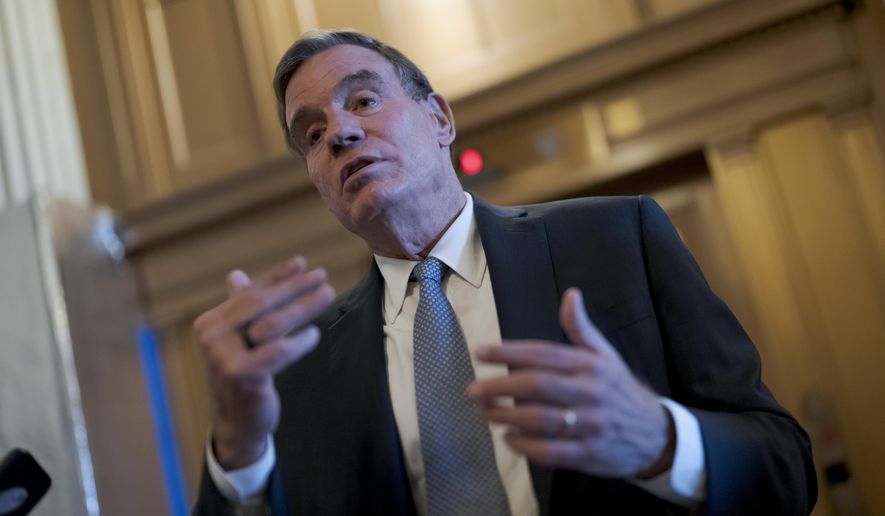Sen. Mark Warner, Virginia Democrat and a member of the Senate banking committee, downplayed the campaign contributions he received from the failed Silicon Valley Bank by saying Monday that he was unswayed by them.
The Virginia lawmaker, who was among 17 Senate Democrats in 2018 to vote in favor of a partial rollback of banking regulations under the Dodd-Frank Act passed in the aftermath of the 2008 financial crisis, said he “has never been influenced by campaign contributions on any issue.”
“If there was malfeasance, of course, I’ll return it,” Mr. Warner told reporters at a breakfast hosted by The Christian Science Monitor in Washington. “I’ll give it to charity. But let’s get our facts first.”
Mr. Warner’s campaign, which was among several to take contributions from Silicon Valley Bank, got more than $27,000 from it, including $21,600 in donations from its political action committee and $5,600 in donations from then-CEO Greg Becker.
Mr. Warner said Monday that the contributions go back to around 2014.
The March 10 collapse of Silicon Valley Bank and Signature Bank were the second and third-largest bank failures in U.S. history.
Stocks gained Monday as fears eased about the potential for a contagion of bank collapses, and investors looked for the Federal Reserve to scale back an aggressive interest-rate increase this week. The Dow Jones Industrial Average was up 382 points, or 1.2%, to close at 32,244 points.
The banks’ troubles have been blamed in part on the Fed Reserve’s rapid series of rate increases, which reduced the value of their long-term debt. The banks were unable to fulfill the run of withdrawal demands from depositors seeking higher yields elsewhere.
SVB wasn’t the only bank with that problem. U.S. banks were sitting on $620 billion in assets that decreased in price but hadn’t been sold by the end of 2022, according to the Federal Deposit Insurance Corp.
Rep. Patrick McHenry, North Carolina Republican and House Financial Services Committee chairman, and Sen. Tim Scott of South Carolina, top Republican on the Senate banking committee, demanded information Monday from the Federal Reserve and the FDIC about their regulatory actions on SVB and Signature Bank for the two years leading up to their collapse.
The lawmakers are also requesting that the Fed and FDIC preserve all related records.
“Our oversight responsibilities to the American people require that we evaluate the root causes of these bank failures as well as the failures of U.S. regulatory agencies to prevent these collapses from occurring,” Mr. McHenry and Mr. Scott wrote. “These responsibilities include obtaining full information about what appears to be glaring bank mismanagement, fundamental lack of prudence in bank risk and balance sheet management, and regulators’ lack of basic supervision and enforcement of safety and soundness rules, regulations, and principles.”
Other critics also have blamed a rollback of banking regulations under the Trump administration that exempted banks with less than $250 billion in assets from Fed stress tests.
In a letter to Mr. Becker last week, Sen. Elizabeth Warren, Massachusetts Democrat and member of the Senate banking panel, pressed the former CEO on the bank’s lobbying efforts in favor of lighter regulations ahead of the 2018 rollback.
“These rules were designed to safeguard our banking system and economy from the negligence of bank executives like yourself – and their rollback, along with atrocious risk management policies at your bank, have been implicated as chief causes of its failure,” Ms. Warren wrote.
“You have nobody to blame for the failure at your bank but yourself and your fellow executives,” she said. “You lobbied for weaker rules, got what you wanted, and used this opportunity to abdicate your basic responsibilities to your clients and the public – facilitating a near-economic disaster.”
Mr. Warner said he does not regret his vote in 2018 to loosen banking regulations.
“Let me be clear, we need to figure out what happened,” he said Monday. “And if there were things that happened in 2018 that helped create this crisis, I’m wide open to making changes.”
“If you look at capital requirements, at least all the evidence so far, this was not a case of increased capital requirements would have prohibited this,” he said of the bank failures.
“I think this was a liquidity crisis and what I find unconvincing is that some stress test alone would have spotted this. Let’s get the facts before we come up with a solution,” he said.
• Dave Boyer can be reached at dboyer@washingtontimes.com.
• Joseph Clark can be reached at jclark@washingtontimes.com.




Please read our comment policy before commenting.